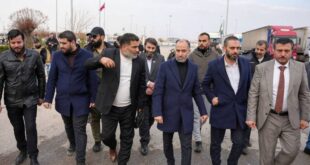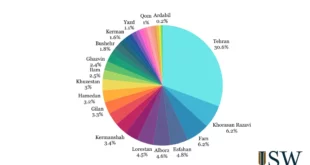PRISONER ABUSE REPORTS are dominating the news in Iraq, but poverty is also producing shocking images — of families living on rotting garbage dumps.
“We are lost people. Nobody cares about us,” said Moussa Jabr, as flies swarmed around his young children’s faces near rotting food, slimy plastic bags and empty tin cans piled high.
A violent insurgency and security crackdowns have generated headlines but overshadowed many of the social and economic problems plaguing Iraq since US-led troops toppled Saddam Hussein in 2003 with the promise of democracy and prosperity.
Unemployment runs high and bloodshed is keeping investors away from the battered economy, forcing some Iraqis to eke out an existence by sifting through garbage for scraps of food.
Families like the Jabrs fear there is no way out.
“We want Iraq or the rest of the world to notice us,” said Jabr, who lives near a festering dump on the edge of Baghdad.
When Saddam’s agents destroyed their homes in the Shiite-populated marshlands of southern Iraq, the Jabrs and others moved to Baghdad looking for work. Money was scarce and life only got worse after the Iraqi leader was ousted.
Everyday they comb Baghdad neighbourhoods for trash, hoping to find valuables to sell or leftover food. They fill plastic bags with trash and bring them to their dump. Birds and cows also pick through the waste as US helicopters fly overhead.
With no electricity, such families seek refuge from winter cold and blistering summer heat in small huts made of cooking oil cans, bits of drift wood and mud.
Water is gathered from dirty, leaking pipes nearby and carried in plastic jugs on donkeys.
The harsh conditions rarely make headlines in the Iraqi or foreign media, whose attention is now focused on a group of prisoners found locked in an interior ministry bunker.
Baghdad, where more than three million Iraqis live, is not the only place where the desperately poor struggle to survive.
In the southern city of Najaf, about 100 families occupy more than 50 tent-like shelters built of tin and plastic bags on top of a sprawling garbage dump.
“I work with my parents collecting garbage,” said eight- year-old Saad Hassan. “I sit everyday and I collect string, tin cans and other useful things.â€
“After finishing my work I make a ball from string and play with the other kids living here. I wish I could study in a school in Najaf,” he said.
Mukhalad Khidir earns just over a dollar a day collecting iron and metal cans to sell to factories, the same work he did during vacations when he was a soldier in Saddam’s army.
“These days, after the fall of the regime, nobody comes from the government to see the tragedy we are living in,” he said.
The US-backed Iraqi government has repeatedly promised to stamp out the raging insurgency and revive the economy.
But few Iraqis, including the Jabr family, expect that to happen any time soon.
“We heard promises. But we live here and around us we hear bombs. All we have gotten is American tanks,” said Musa Jabr.
 Eurasia Press & News
Eurasia Press & News


